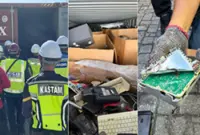PETALING JAYA: Harsher penalties alone under new amendments to the Environmental Quality Act will not spare the country’s water sources from pollution if there is a lack of manpower to enforce the provisions, said stakeholders and trade groups.
They argued that the longer reach of the law under the new amendments would remain ineffective should there be a lack of manpower on the part of the Environment Department (DOE) and suggested extending investigative and enforcement powers to other agencies.





